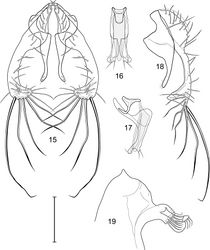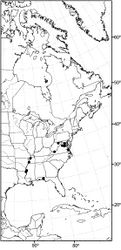Allotrichoma deonieri
| Notice: | This page is derived from the original publication listed below, whose author(s) should always be credited. Further contributors may edit and improve the content of this page and, consequently, need to be credited as well (see page history). Any assessment of factual correctness requires a careful review of the original article as well as of subsequent contributions.
If you are uncertain whether your planned contribution is correct or not, we suggest that you use the associated discussion page instead of editing the page directly. This page should be cited as follows (rationale):
Citation formats to copy and paste
BibTeX: @article{Mathis2012ZooKeys161, RIS/ Endnote: TY - JOUR Wikipedia/ Citizendium: <ref name="Mathis2012ZooKeys161">{{Citation See also the citation download page at the journal. |
Ordo: Diptera
Familia: Ephydridae
Genus: Allotrichoma
Name
Allotrichoma deonieri Mathis & Zatwarnicki – Wikispecies link – Pensoft Profile
Description
This species is distinguished from congeners by the following combination of characters: Small shore flies, body length 1.20–1.95 mm. Head: Medial facial carina above facial prominence shallow; labella broad, fleshy, shorter than mediproboscis; clypeus microtomentose, usually gray.
Thorax: Presutural supra-alar seta present. Wing with costal vein ratio 0.31–0.39; M vein ratio 0.38–0.40.
Abdomen: Male 5th sternal flap in lateral view (Fig. 19) moderately elongate, curved, truncate apex bearing numerous setulae; 5th medial process in lateral view (Fig. 19) elongate, bar-like, slightly curved, 4–5 setulae apically. Male terminalia (Figs 15–18): Epandrium in posterior view (Fig. 15) V-shaped with ventrolateral margin rounded and curved medially to base of surstyli; epandrium in lateral view (Fig. 18) somewhat narrowly rectangular on dorsal half than abruptly projected and angled anteriorly before taper posteroventral to base of surstyli; cerci in posterior view (Fig. 15) approximate dorsally then extended laterally to form an inverted V, each cercus robustly developed, medial margin distinctly sinuous, lateral margin shallowly and mostly evenly curved, bearing setae throughout length, especially medially and with very long setulae apically at expanded apex; cercus in lateral view (Fig. 18) lunate on dorsal third, then narrowed, linear before expanded, truncate apex; surstyli (ventral extensions of epandrium) in posterior view narrow, broader at base, tapered to apex, apical 1/3 shallowly recurved and very slightly spatulate, bearing several short setulae; surstylus in lateral view (Fig. 18) tapered on basal third, thereafter ventrally parallel sided and shallowly curved, apical fourth bearing several short setulae; aedeagus in ventral view (Fig. 16) elongate, narrowly ovate, bullet-like; very slightly tapered apically, in lateral view (Fig. 17) elongate, nearly parallel sided, apex bluntly rounded; phallapodeme in lateral view (Fig. 17) triangular, keel moderately tapered to form a triangular; gonite in ventral view (Fig. 16) bar-like, mostly parallel sided except for short, lateral expansion at apex; gonite in lateral view (Fig. 17) generally elongate, moderately wider basally, thereafter tapered gradually toward apex, apex produced as a lateral and ventral process, lateral process bearing 2 setulae, apical, process longer, bearing 1 setula.
Type material
The holotype male Allotrichoma deonieri is labeled “USA. V[IRGINI]A. Spotsylvania: Rappahannock River[,] 38°18.8'N, 77°32.5'W), 14 Aug 2006, D. & Wayne N. Mathis/USNM ENT 00199488 [plastic bar code label]/HOLOTYPE ♂ Allotrichoma deonieri W. Mathis & T. Zatwarnicki USNM [red].” The holotype is double mounted (minuten in a block of plastic), is in excellent condition, and is deposited in the USNM. Thirteen paratypes (10♂, 3♀; USNM) bear the same label data as the holotype. Other paratypes are as follows: VIRGINIA. Fairfax: Great Falls (Clay Pond; 39°00.1'N, 77°15.4'W), 13 Jun-17 Aug 2006, 2007, D. and W. N. Mathis (3♂; USNM); Great Falls (Patowmack Canal; 39°00.1'N, 77°15.2'W), 25 Jul-29 Aug 2006, 2007, 2008, D. and W. N. Mathis (8♂; USNM); Turkey Run (38°57.8'N, 77°09.4'W), 10 Jul 2008, W. N. Mathis (1♂; USNM); Turkey Run (mouth; 38°57.9'N, 77°09.4'W), 8 Aug-17 Sep 2006, 2007, 2008, W. N. Mathis (31♂, 2♀; USNM). Rappahannock: Hazel River (NW Culpeper; 38°33.8'N, 78°11.6'W, 171 m), 28 Jun-24 Jul 2008, W. N. Mathis and T. Zatwarnicki (3♂; USNM). Spotsylvania: Rappahannock River (38°18.8'N, 77°32.5'W), 3 Jul 2007, D. and W. N. Mathis (9♂; USNM). Stafford: Aquia Harbour, Aquia Creek (38°27.8'N, 77°23.1'W), 2 Sep 2006, D. and W. N. Mathis (1♂; USNM); Aquia Harbour, Lions Park (38°27'N, 77°23.3'W), 10 Apr-11 Aug 2006, 2009, W. N. Mathis (2♂; USNM); Falmouth (38°19.2'N, 77°28.1'W; Rappahannock River; 9 m), 30 Jun 2007, D. and W. N. Mathis (3♂; USNM). York: Maury Lake (ca. James River; 37°02.5'N, 76°29.2'W), 19 Aug 2006, D. and W. N. Mathis (1♂; USNM).
Type locality
United States. Virginia. Spotsylvania: Rappahannock River (38°18.8'N, 77°32.5'W).
Other specimens examined from the New World
UNITED STATES. FLORIDA. Walton: Morrison Spring (30°38.7'N, 85°53.7'W), 31 Jul 1962, D. L. Deonier (1♂; USNM).
LOUISIANA. East Carroll: Lake Providence (32°48.3'N, 91°10.2'W), 14 Jul 1953, W. W. Wirth (1♂, 2♀; USNM).
MARYLAND. Garrett: Broadford Lake (39°24.7'N, 79°22.4'W; 750 m), 20 Jun 2007, D. and W. N. Mathis (1♂; USNM).
MISSISSIPPI. Washington: Leroy Percy State Park (W Hollandale; 33°09.8'N, 90°56.2'W; 63 m), 9 Jun 2004, W. N. Mathis (6♂, 3♀; USNM).
TENNESSEE. Obion: Reelfoot State Park, Reelfoot Lake (36°21.1'N, 89°25.5'W), 16 Aug 1962, D. L. Deonier (3♂, 7♀; USNM). Shelby: Meeman Shelby State Park (Piersol Lake; 35°20.4'N, 90°02.1'W; 98 m), 10 Jun 2004, W. N. Mathis (4♂, 4♀; USNM).
WEST VIRGINIA. Mercer: Ceres (Kee Reservoir; 37°18.4'N, 81°10.4'W; 757 m), 24 Sep 2007, D. and W. N. Mathis (1♂; USNM).
Distribution
(Fig. 20) Nearctic: United States (Florida, Louisiana, Maryland, Mississippi, Tennessee, Virginia, West Virginia).
Etymology
The species epithet, deonieri, is a genitive patronym to honor one of the collectors of this species, D. L. Deonier, a long-time student of shore flies. Dick is not only our friend and colleague but an excellent field biologist. His collecting efforts have greatly assisted our research on shore flies.
Remarks
Although most records of this species are from the drainage of the Mississippi River, including nearby tributaries, the records from Maryland and Virginia represent a completely different drainage system.
Taxon Treatment
- Mathis, W; Zatwarnicki, T; 2012: Revision of New World Species of the Shore-fly Subgenus Allotrichoma Becker of the Genus Allotrichoma with Description of the Subgenus Neotrichoma (Diptera, Ephydridae, Hecamedini) ZooKeys, 161: 1-101. doi
Other References
- ↑ Mathis W, Zatwarnicki T (2010) New species and other taxonomic modifications for shore flies from the Delmarva States (Diptera: Ephydridae). Proceedings of the Entomological Society of Washington 112: 97-128. doi: 10.4289/0013-8797-112.1.97
Images
|

